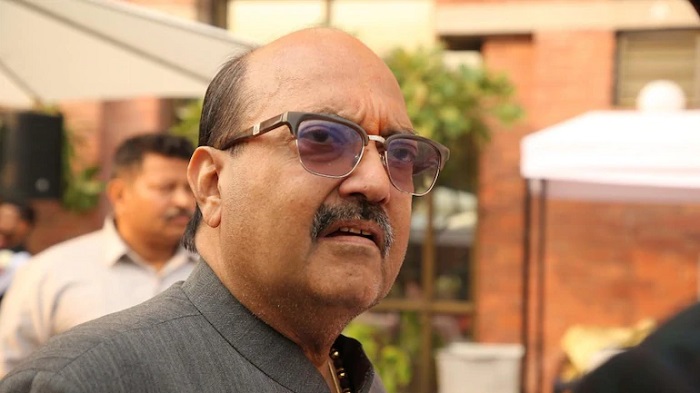
New Delhi, April 19: India on Wednesday made the most persuasive case for India's "full membership" of the global non-proliferation regimes. In a major policy statement, foreign secretary Ranjan Mathai told a gathering of nuclear experts that "the logical conclusion of partnership with India is its full membership of the four multilateral regimes."
Mathai, unusually, gave a detailed exposition of India's own strategic export control regime, national laws governing trade in sensitive items and its enforcement mechanisms. The aim, said officials, was to be more open about India's own efforts and systems while making a more compelling case for New Delhi's membership to the non-proliferation regimes. India's efforts to join the four top non-proliferation regimes - Nuclear Suppliers Group (NSG), Missile Technology Control regime (MTCR), Australia Group and Wassenaar Arrangement - started out in November 2010, but the campaign is yet to acquire critical mass.
While India is yet to make a formal application to join the regimes, its proposed membership has started a debate in these clubs. Over the next few months, all four clubs will be holding their plenary sessions where the Indian case will figure prominently. The government believes the top diplomat's statement today will provide an impetus to India's case and stir the debate. Another complaint has been about India's almost brahminical approach to what its doing in the non-proliferation field. Thus far, there has been little attempt by the Indian government to explain its non-proliferation objectives, systems and mechanisms to the world. With Mathai's speech, the government is also trying to clear the cobwebs about itself to the world.
In the months since November 2010, when India made a bid to join these groups, India has held several "outreach" sessions with all four. Mathai said he was in Vienna in March for the NSG outreach, while he expected to conduct an Australia Group outreach within the next few weeks. But its now being felt in the government that the Indian campaign has to move into higher gear. Today was a sort of opening salvo. Mathai clarified India has placed 12 out of 14 of its nuclear reactors under international safeguards, which puts India well within the deadline for compliance with its separation plan. He also reiterated India's commitment to ratify the additional protocol which envisages more intrusive checks into India's civilian nuclear sector.
India's membership is not an easy decision. First, there is an NPT adherence that is seen as crucial criteria. India has not signed the NPT and is not likely to do so, as a non-nuclear weapons state. So India's membership into these groups would have to take this refusal into account. Trying to transcend this hurdle, Mathai suggested they look at the bigger picture. "There are underlying objectives and principles that are common to all the regimes to which India subscribes to fully as it has demonstrated responsible non-proliferation and export control practices and has shown the ability and willingness to contribute substantially to global non-proliferation objectives." Whether this is acceptable is not yet clear. Although India wants to join with the four regimes in tandem, the NSG is believed to be the more important one. This year, India believes that with the US at the helm of NSG, its case might be easier.
Mathai said India, has the ability to produce and manufacture a large portion of the products that are controlled by these regimes. "As India's integration with the global supply chains moves forward, it would be in the interest of the four regimes that India's exports are subject to the same framework as other major supplier countries." It effectively puts the onus elsewhere - that outside the club, India can still manufacture sensitive items and they would be unregulated by the non-proliferation regimes. This should be a powerful argument for India being inside the tent. Of course, he left unsaid the fact that China's decision to supply nuclear reactors to Pakistan without the NSG waiver, has actually emasculated the global body.
Instead, Mathai interestingly placed India's actions and objectives of strong export control systems within India's development matrix. "As India's integration with global trade patterns and supply chains deepens, it would increasingly become an important hub of manufacturing and export of high technology items. Foreign investment including through offsets for governmental procurement will strengthen our global links. Our export control system would add to the reliability and credibility of Indian companies in the global market and thus increase their competitive edge."
The foreign secretary added, "India has continued with its policy of refraining from transfer of enrichment and reprocessing technologies (ENR) to states that do not possess them and supporting international efforts to limit their spread." While India might be fully in compliance, the NSG has adopted a guideline that prevents ENR technologies from going to non-NPT states. This would put India out of the box. The current negotiations are trying to square that circle. Mathai said India supports the IAEA's fuel-bank resolution and pitched to become a supplier state. Obviously, India cannot be a full supplier if it cannot access latest ENR technologies.
India, he said, not only had a series of legislative tools to control sensitive trade - from Atomic Energy Act, Customs Act of 1962 to the WMD Act of 2005 - to a robust enforcement mechanism. Mathai said, "DGFT is in the process of introducing by June this year an online application system that would not only further ease the application process but also facilitate implementation." He added, "We view a strong and effective national export control system as an essential link between our broader national security goals and our wider foreign policy objectives."






Comments
Add new comment